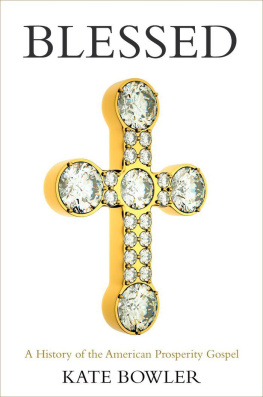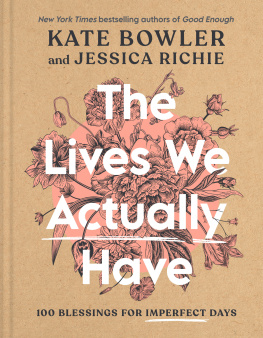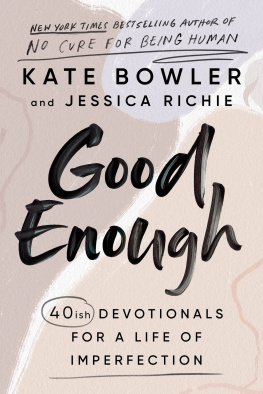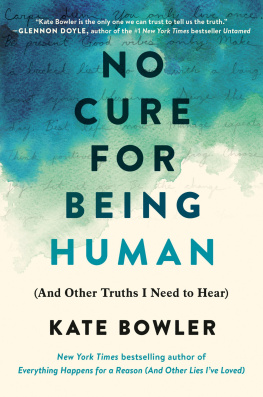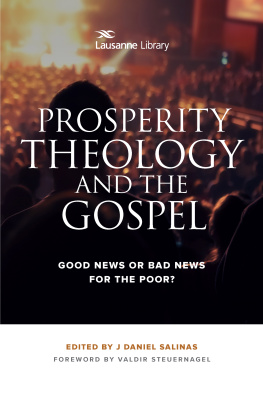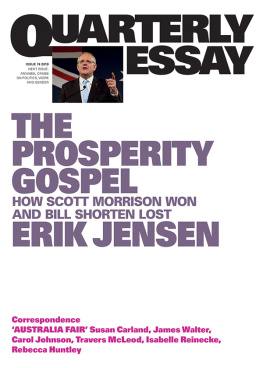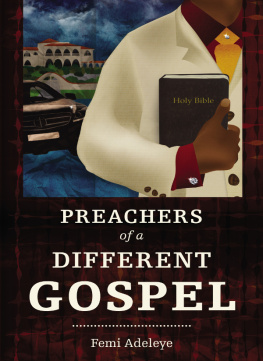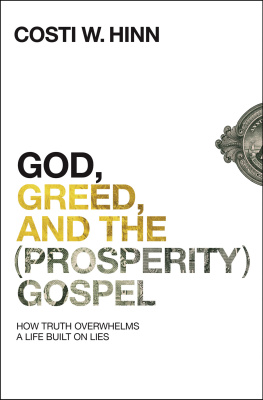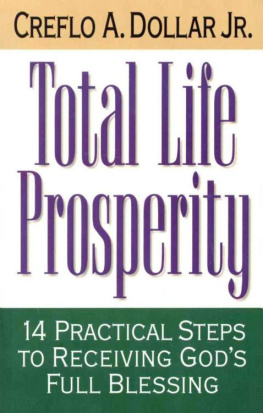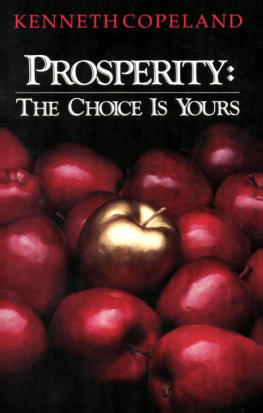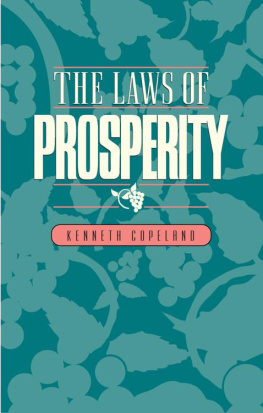Blessed
Blessed
A History of the American Prosperity Gospel

KATE BOWLER


Oxford University Press is a department of the University of Oxford.
It furthers the Universitys objective of excellence in research,
scholarship, and education by publishing worldwide.
Oxford New York
Auckland Cape Town Dar es Salaam Hong Kong Karachi
Kuala Lumpur Madrid Melbourne Mexico City Nairobi
New Delhi Shanghai Taipei Toronto
With offices in
Argentina Austria Brazil Chile Czech Republic France Greece
Guatemala Hungary Italy Japan Poland Portugal Singapore
South Korea Switzerland Thailand Turkey Ukraine Vietnam
Oxford is a registered trade mark of Oxford University Press
in the UK and certain other countries.
Published in the United States of America by
Oxford University Press
198 Madison Avenue, New York, NY 10016
Oxford University Press 2013
All rights reserved. No part of this publication may be reproduced, stored in a retrieval system, or transmitted, in any form or by any means, without the prior permission in writing of Oxford University Press, or as expressly permitted by law, by license, or under terms agreed with the appropriate reproduction rights organization. Inquiries concerning reproduction outside the scope of the above should be sent to the Rights Department, Oxford University Press, at the address above.
You must not circulate this work in any other form,
and you must impose this same condition on any acquirer.
Library of Congress Cataloging-in-Publication Data
Bowler, Kate.
Blessed : a history of the American prosperity gospel / Kate Bowler.
p. cm.
Includes bibliographical references and index.
ISBN 978-0-19-982769-5
1. Faith movement (Hagin)United States.
2. United StatesChurch history20th century. 1. Title.
BR1643.5.B68 2013
277.3083dc23 2012038602
1 3 5 7 9 8 6 4 2
Printed in the United States of America
on acid-free paper
To my parents,
for their loving home.
And to Toban,
for bringing it with us
on all lifes journeys .
Contents
IN A STUDY of divine money, I certainly enjoyed an embarrassment of riches. I experienced an abundance of care, support, and guidance when undertaking this project. I can never express the full measure of gratitude I owe my family. My husband, Toban, offered his support with characteristic sweetness. I imagine perfection looks a lot like a husband who (without caring what I chose for my profession) happily chats about our book while making dinner. And sanctification is surely sharing a home office with me. My mother and father approached every obstacle in my life as an opportunity to be helpful. When health problems prevented me from finishing the manuscript, they drove across the continent just to offer editorial and culinary support. In a calculus I will never understand, they actually seemed grateful. I could not have made it over the finish line without my siblings, Amy, Maria, and brother-in-law John, who cheerfully helped at different stages of my dissertation. And to my extended family, Chelsea, her friendship demands a book of its own.
This book began as a dissertation and benefited immeasurably from the support of my committee. My advisor, Grant Wacker, makes mentorship a ministry. His insistence on clarity, compassion, and active verbs made it impossible to form thoughts without first wondering WWGD. Tom Tweed always went above and beyond to give me the tools to think critically. He approached every argument with a young scholars needs at heart: wit, care, and a razor blade. Mark Chaves forced me to come to grips with actual social science, while Glenn Hinson brought storytelling back to history for me. Julie Byrne made everything look easy.
A wonderful community of scholars helped me along. Scott Billingsley, Phil Sinitiere, Shayne Lee, Gerardo Marti, Larry Eskridge, Kathryn Lofton, Ed Harrell, Katie Hladky, Wallace Best, Arlene Snchez Walsh, Jonathan Walton, Tamelyn Tucker-Worgs, and Matt Sutton enriched my work by their example and wise counsel. David Roebuck of the Dixon Pentecostal were included in Candy Gunther Browns Global Pentecostal and Charismatic Healing (Oxford 2011). Her editorial pen and rich insights continue to improve my thinking.
This research was aided with the generous support of the Centre for Research on Canadian Evangelicalism, whose intellectual powerhouse, John Stackhouse, oversaw my research on Canadian iterations of the prosperity gospel. My travel to Israel with Benny Hinn in 2008 was made possible by an international travel grant from Duke University.
At Duke Divinity I found a theological home and a community of endless support. Many thanks to my doctoral cohortespecially Mandy McMichael, Heather Vacek, Angela Tarango, Wen Reagan, Sarah Ruble, Elesha Coffman, Brendan Pietsch, Joshua Vis, and Seth Dowlandfor nurturing these ideas over so many years. If my new colleagues tired of lecture after lecture on Joel Osteen, they never let me know it. In hallowed halls where Masterpiece Theatre always seems to be playing faintly in the background, they encouraged me to be myself. In particular, Richard Hays, Laceye Warner, and Edgardo Coln-Emeric made special efforts to support my research. Dave Odom and Bill Lamar from Leadership Education at Duke Divinity made Herculean efforts on my behalf. A special thank you goes to my students, who not only bought me Joel Osteens board game but took up the questions posed by the prosperity gospel with compassion and rigor. I am so grateful for the opportunity to be a part of their lives and our common pursuit of service to the church.
Many thanks to Cynthia Read, Sasha Grossman, Joellyn Ausanka, and the editorial staff at Oxford University Press for their many efforts in bringing this book into the cold light of day. Judith Heyhoe of Duke Divinity School cast her expert editorial eye on my work for two long years, bringing it so much closer to what it ought to be. And thank you to David Steinmetz, who always seemed to think I was worth reading without having read a word.
Finally, I owe a debt of appreciation to the many people in the pulpits and the pews who shared their lives with me, especially the members of Durhams Victorious Faith Center. Gratitude bestows reverence, observed John Milton, allowing us to encounter everyday epiphanies, those transcendent moments of awe that change forever how we experience life and the world. This work has been deepened by their everyday epiphanies.
Blessed
THE VICTORIOUS FAITH CENTER sign blinked red. The church was squat and wide, an inauspicious storefront sandwiched between a nail salon and a payday loan office in a Durham, North Carolina, mini-mall. For years I had been studying churches with triumphant names like World Overcomers and Victory International to trace an emerging movement, famous for promises like the one before me in bright neon: Victorious Faith. The movement goes by different names, ranging from the slightly pejorative (Health and Wealth or Name It and Claim It) to the vaguely descriptive (Faith or Word of Faith) to the blunt shorthand, the prosperity gospel. Though it is hard to describe, it is easy to find. The prosperity gospel is a wildly popular Christian message of spiritual, physical, and financial mastery that dominates not only much of the American religious scene but some of the largest churches around the globe.
The pastor and first lady of the Victorious Faith Center agreed to meet to discuss my study of the prosperity movement, and I was eager to discover their connections to the larger ministerial networks that dominate this movement.movement began to emerge. Pastor Walton had spent several years learning from the televangelist host of Success-N-Life , Robert Tilton, at his Bible school in Texas. He has sustained the momentum of his ministry by reading prosperity publications and by taking intermittent trips to witness divine healer Benny Hinns crusades. The local church sows money like seeds into the international ministries of celebrities like Creflo Dollar, Kenneth Hagin, and Joel Osteen. While Pastor Walton sees his insights and preaching bubbling up from the wellsprings of scripture and personal revelation, in song, sermon, and giving, his Sunday mornings at the Victorious Faith Center also closely resemble thousands of similar churches dotting the American religious landscape.
Next page
